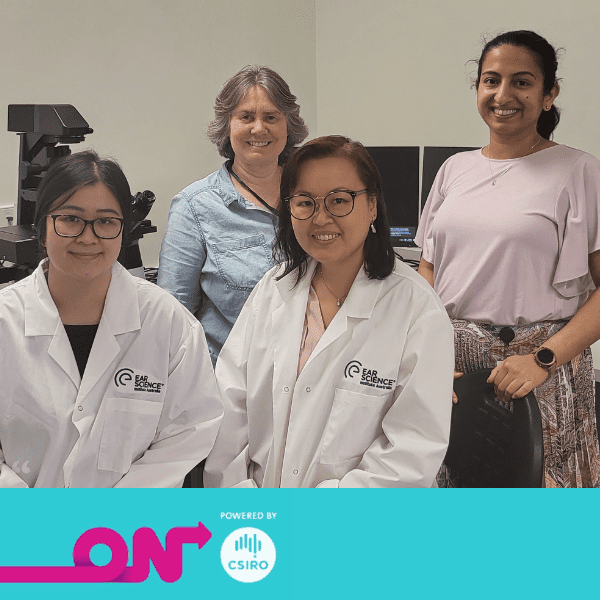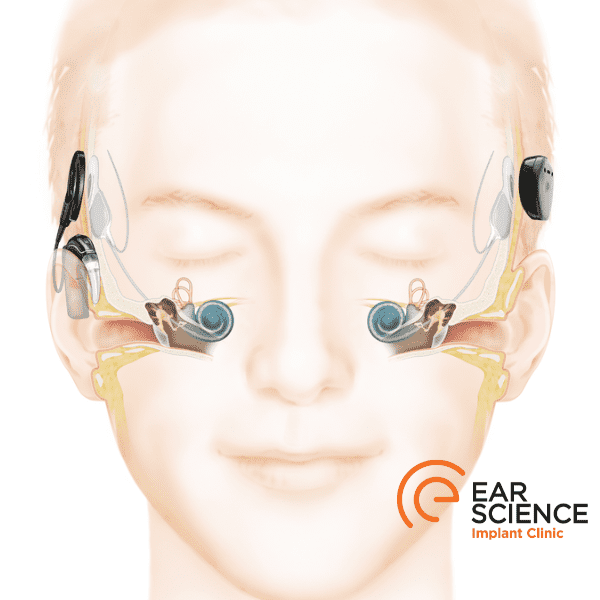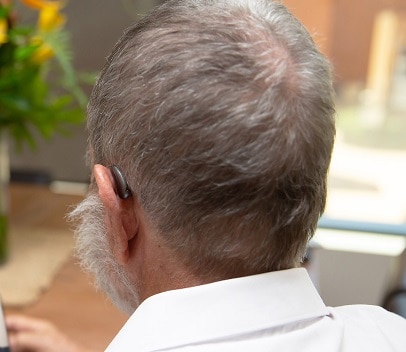A Hearing Implant solution for severe and profound hearing loss
Cochlear Implants might be a suitable option for people experiencing significant hearing difficulty. This hearing difficulty occurs despite using traditional amplification devices such as hearing aids or assistive listening devices.
The hearing implant is an electronic medical device that replaces the function of the damaged hair cells in the cochlea. Standard hearing aids make sounds louder. However, an implant in the cochlea will directly stimulate the auditory nerve. This means the implant will work on the damaged structure to provide sound signals to the brain. It also provides a long-term, stable hearing outcome.
How a cochlear implant works
It is an intricate and tiny electronic device that can enable a person with severe to profound hearing loss or who is very hard of hearing to gain a sensation of sound by directly stimulating the structures of the inner ear.
An exterior sound processor of the hearing implant rests behind the ear, while a second part is surgically implanted beneath the skin. During an outpatient procedure, the internal portion is implanted beneath the skin behind the ear. The cochlea, part of the inner ear, is reached by a thin cable and several tiny electrodes. The wire transmits impulses directly to the nerve, which transmits sound information to the brain, resulting in a sensation of sound. An individual with limited speech processing ability is likely to be able to understand speech even with minor background noise.
Cochlear implants are made up of several intricate components. Firstly, a high-quality microphone that accurately picks up surrounding sounds works with a speech processor that picks and organises sounds captured by the cochlear implant. A transmitter and receiver will then receive speech-processing signals and transform them into electric impulses. An electrode array is a final step wherein electrodes that gather stimulator impulses will transmit the impulses to various parts of the cochlear nerve.
Although normal hearing cannot be restored, a cochlear implant can enhance hearing with the right rehabilitation and practice. This will lead to a greater awareness of sounds and improved communication.
You may benefit from these hearing implants if, when wearing hearing aids, you
- Often ask people to repeat themselves
- You find it difficult to follow a group conversation and avoid social situations
- You struggle to understand what is being said if people do not face you while talking
Researchers at Ear Science Institute Australia, Curtin University and UWA are investigating new treatments for hearing loss

Front row: Joey Lye, Dr Elaine Wong
Back row: Sharon Redmond & Varda Sardesai
1 in 6 Australians live with hearing loss, and we are investigating your experience living with hearing loss or supporting someone with hearing loss to better understand your needs.
Supported by the CSIRO On Prime program, we invite you to participate in this research project and participate in a 15-minute phone or video interview with the research team.
You will be asked a series of questions related to your life with hearing loss or how you support a person living with hearing loss.
Join us in finding new treatments for today.
Cochlear Implant candidacy in Australia
Any person with a moderately severe to profound hearing loss of a sensorineural nature (in the inner ear or cochlear) in one or both ears might be a possible candidate for cochlear implant surgery.
In most cases, the person must have trialled hearing aids unless the hearing loss is severe enough not to be fitted with a hearing aid. There is no lower or upper age limit. An audiological and medical assessment will review the integrity of the auditory nerve, basilar membrane and other structures. Expectations will then be discussed, depending on the hearing and amplification history provided during the assessment.

What’s involved in the implantation procedure?
To review possible candidacy, we require a recent audiogram. A summary of the hearing and amplification history should be provided. Once our clinic has received this information, we can book an appropriate appointment. The next step should hopefully be getting you scheduled for cochlear implant surgery.
During this appointment, amplification devices will assess your hearing, and the results will be discussed. We will recommend ensuring that you receive the best possible hearing outcome. If you are a suitable candidate for the hearing implant, you will be referred for a medical review.
If you are not a suitable candidate, other recommendations will be provided to address your hearing concerns.
Expected hearing benefits
Hearing through a cochlear implant is different from hearing through a hearing aid.
These devices are life-changing for many of our clients. How well you do with an implant can depend on many things, everyone is different. Our research shows that most adult implant recipients report significantly improved hearing in quiet and noise. People with many types of hearing loss could benefit from a cochlear implant.
Cochlear implant costs can vary, but maintaining them is inexpensive once installed. You also don’t have to worry about big components sticking out or being visible to the people around you. Cochlear implants are sometimes called ‘invisible’ due to how small the components are and how well they can blend with hair.
Talk to someone who knows.
Ear Science Implant Clinic offers a mentor program. This allows you to speak with someone who understands your feelings and has been through the hearing implant journey.
Our Mentors are kind, caring people who are happy to volunteer their time and share their experiences to support you.
Cochlear Implant FAQs
Cochlear implants provide better hearing than hearing aids when: the person has a specific type and degree of hearing loss. Cochlear implants are a great solution when hearing aids can no longer provide sufficient speech clarity and understanding. It also provides a long-term stable hearing solution to people with progressively, deteriorating hearing losses.
A cochlear implant might be right for you if you struggle to understand speech, even with correctly fitted hearing aids. Answering the questions below can provide some insight if a cochlear implant might be right for you.
When wearing well-fitted hearing aids, do you:
- Find it hard to hear on the phone?
- Often ask people to repeat themselves?
- Find it difficult to follow a group conversation and avoid social situations?
- Rely on lip-reading to understand what is being said?
If you answer yes to these questions, you may benefit from a cochlear implant.
You can also call our Ear Science Implant Clinic team to speak to a cochlear implant recipient or come in to see one of our audiologists to find out if a cochlear implant might be right for you.
In Australia, cochlear implants are well-funded. The three main funding options are private health insurance, the Department of Veterans Affairs and the public health system.
For those with private health coverage, most of the costs are covered by your insurance provider, including the hearing implant cost. There is no waiting time, you can choose when you would like to have your surgery, and device upgrades are covered, saving you several thousand dollars every 3 to 5 years. The cost of the surgery and your hospital stay will depend on your surgeon and your level of health insurance coverage.
The West Australian State Government funds a certain number of implants every year. If you choose this funding option, services are provided by your tertiary hospital; you will need to obtain a referral to ENT from your GP – must this be to the ENT Department from your GP.
If you have a Veterans’ Gold Card or White Card specific for hearing loss, the costs associated with a hearing implant may be covered in full by the Department. The Ear Science team can assist you in understanding what you are eligible for.
Cochlear implants may be a suitable option for people of all ages, from babies to 90 year olds and older. You are never too old or too young for a cochlear implant. The only requirement is that you fit the candidacy criteria, including limited hearing aid benefit and a significant degree hearing loss.
As long as you are healthy and pass an ENT specialist’s medical review, then a cochlear implant might be right for you. Our oldest recipient was 98 years at the time of surgery, and she loved her implant.
Surgery takes only 1 to 2 hours with an overnight stay in the hospital.
Initially, it can be overwhelming as your brain makes sense of so many sounds that you haven’t heard for many years. For me, it was a dripping tap and the sound of rain on the roof, I had not heard these sounds for about ten years before my implants. So as you can imagine, it is an exciting time, but it can take a while to get used to these new sounds, and you need to be patient.
The sounds you will hear through your cochlear implant sound different to what you remember ‘normal’ speech to sound with and without your hearing aids. But with hard work and the specialist support of the audiologists at Ear Science Implant Clinic, you will adjust to hearing differently, with everyone working towards you hearing your best.
I still find hearing and listening challenging in some situations, such as when I am in background noise. However, I can now participate in conversations that I missed out on before.
Cochlear implants will aid your hearing, but it is essential to have realistic expectations of what they can do and what they might initially sound like.
Sound quality: Sounds around you may seem different when you first get your cochlear implant. Your audiologist will initially set your device to your hearing levels. Depending on how long you’ve had a hearing loss, it could have been some time since you’ve heard certain sounds at their regular pitch and volume. While sounds may be different, it is important to remember that the more you wear your cochlear implant, the more natural sounds will become.
Voice: Your voice will sound different at first. It is essential to do lots of reading aloud to get used to hearing your own voice. If you have any discomfort, discuss this with your audiologist.
Background noise: Background noise is annoying and a nuisance for everyone. Even people with normal hearing have difficulty understanding speech clearly in background noise. Cochlear implants cannot remove or eliminate background noise, no matter the level of technology – instead, they will help reduce it and improve the level of comfort.
Cochlear implants bypass the damaged part of your inner ear, the cochlear, to stimulate the hearing nerve. A cochlear implant can make sounds clearer, not just louder. It also provides a long term, stable hearing outcome.
Any person with a moderately severe to profound degree of hearing loss of a sensorineural nature (in the inner ear or cochlear) in one or both ears might be a possible candidate for a cochlear implant. In most cases, the person must have trialled hearing aids unless the hearing loss is severe enough not to be fitted with a hearing aid. There is no lower or upper age limit. An audiological and medical assessment will review the integrity of the nerve, and expectations will be discussed, depending on the hearing and amplification history provided during the assessment.
Recovery time after cochlear implant surgery varies, but most patients can return to normal activities within a week. The implant is activated 2 to 3 weeks following surgery, allowing time for healing. You will be provided with a personalised rehabilitation program, including follow-up appointments to adjust the device and monitor your progress.
Yes, cochlear implant technology is continually advancing, and external components can be upgraded without additional surgery. This allows you to benefit from the latest improvements in sound processing and connectivity. Your audiologist will inform you when upgrades are available and discuss the benefits they may offer.


